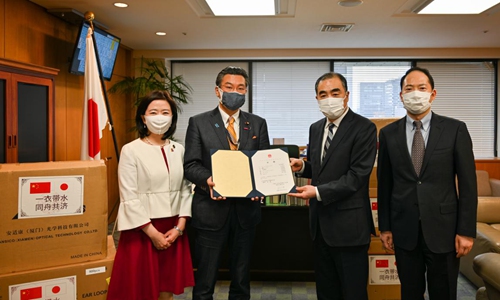Japan blindly following US does no good to ties with China
By Chen Yang Source:Global Times Published: 2020/5/28 17:48:44

Chinese Ambassador to Japan Kong Xuanyou (second from right) presents medical supplies donated by China to Gaku Hashimoto, Japanese state minister of health, labour and welfare, on April 9, 2020. Photo: Courtesy of Chinese Embassy in Japan
China and Japan have offered reciprocal support and assistance in times of the fight against COVID-19. It's a pity to see Japanese Prime Minister Shinzo Abe blindly follow the US steps by saying the novel coronavirus spread from China at a press conference on Monday.
There have also been some claims in Japan that are not conducive to the China-Japan relations. For instance, in the 2020 edition of Japan's Diplomatic Bluebook and draft defense white paper, both Japanese foreign ministry and ministry of defense have hyped up "China threat" from different perspectives.
Japanese foreign ministry chants China-Japan friendship in the bluebook while expresses its support with the island of Taiwan to participate in the World Health Assembly as an observer. In addition, Japanese Defense Minister Kono Taro called on many countries since April to cope with China after the COVID-19 pandemic is settled.
Japan's such negative stance toward China will overshadow the sound development of China-Japan relationship. It is concerning whether the two countries can maintain current sound ties in the post-pandemic era.
When senior US officials repeatedly smear China with coronavirus-related racist terms, Japan did not follow up. Instead, it suddenly brought it up again when the smear campaign was abandoned by the international community. There could be two main reasons for that.
First, Japan's domestic epidemic situation is stabilizing and the Abe administration's focus begins to shift. Japan at first did not follow the US to attack China and the World Health Organization despite pressures from US President Donald Trump and US Secretary of State Mike Pompeo because following suit wouldn't help Tokyo handle the deadly COVID-19.
However, after lifting the coronavirus-related state of emergency, Abe now needs to focus on more than battling COVID-19. He has to maintain Japan-US relations. To show Trump that Japan is picking the US side, Abe began to take actions that could imperil China-Japan relations.
Second, Abe's stance on China was out of his aim to shift Japanese people's dissatisfaction and regain authority within his Liberal Democratic Party (LDP). The Abe administration was unprecedentedly supported in Japan before the pandemic rages across the globe, while Abe himself becomes the prime minister with longest-serving term in the Japanese history and enjoys the power that no predecessors have ever had. But the sudden pandemic exposed various problems of the Abe administration, namely the lack of governance capability, a mess in policymaking, and so on. Many voices from within the LDP criticize Abe for his bungling of the crisis.
Polls conducted by the Asahi Shimbun and the Mainichi on Saturday showed that Abe's approval ratings had fallen below 30 percent. Such being the case, being tough on China is a benign choice to regain support - just as he did almost every time he met problems in ruling the government in the past seven years or so. But it is uncertain whether his cliché will work this time as Japanese people have had significantly different view of China after the two countries made joint efforts to contain the deadly virus.
If we look back over the past few years, we will find that the improvement of China-Japan relations is really hard won. After the two countries' joint fight against the coronavirus, in particular, the two peoples have reached a brand new level of friendship. This is hard won and such relationship needs deliberate care of both countries.
In this context, if the Abe administration wishes to cozy up only the US by blindly following US steps at the cost of hard won sound China-Japan ties, it will undoubtedly fail Japanese and Chinese peoples. And it would also imperil the China-Japan relations that have already entered a new era.
The author is a media professional and a Japan watcher. opinion@globaltimes.com.cn
Posted in: ASIAN REVIEW,OTHER REGIONS